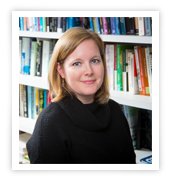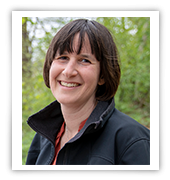Colloquia
The Center for Environmental Politics organizes a monthly colloquium series on environmental politics, policy, and governance. This series is made possible by the generous support of Gary and Susan Duck, UW alumni and long-standing benefactors of the department. Susan passed away in December 2015 after a prolonged illness. We miss her a lot.
The Duck Family Colloquium Series is managed by graduate students. For 2019-2020, Christianna Parr (Political Science Ph.D. Student) will serve as the Richard B. Wesley Fellow in Environmental Politics and Governance and the chair of the Duck Family Colloquium series. The Center will host the following seminars, as described below.
2019-2020 Events

Deborah Sunter
School of Engineering, Tufts
Friday, October 4, 2019
12:00 noon – 1:30 p.m., Olson Room, Gowen 1A
“Race to Solar: Disparities in Rooftop Photovoltaics Deployment in the United States by Race, Ethnicity, and Income”
Deborah Sunter is an Assistant Professor in the Department of Mechanical Engineering at Tufts University. She holds a Ph.D. in Mechanical Engineering from the University of California, Berkeley and B.S. in Mechanical and Aerospace Engineering from Cornell University. She was formerly an AAAS Science & Technology Policy Fellow at the U.S. Department of Energy and a Data Science Fellow at the Berkeley Institute for Data Science. Using computational modeling and data science techniques, her research explores the interface of technology innovation and policy for improved environmental sustainability and social justice.
Please click here for a video of the talk.

Matthew Turner
Department of Geography, University of Wisconsin-Madison
Friday, November 8, 2019
12:00 noon – 1:30 p.m., Olson Room, Gowen 1A
“Climate proofing the Sahel: the knowledge politics surrounding the causation of impoverishment”
Matt Turner is a professor of Geography at University of Wisconsin-Madison. His research program is broadly is concerned with the relationship between social and environmental change in dryland areas of world. Over the past decade, he has focused on understanding the root causes of the agropastoral transitions occurring in dryland West Africa (from intrahousehold to national social scales) and the environmental implications of these transitions. His work contributes to theoretical literatures of political ecology; political institutions and resource management; and the management implications of nonequilibrium ecological dynamics.
Please click here for a video of the talk.

Edward B. Barbier
Department of Economics, Colorado State University
Friday, January 10, 2020
12:00 noon – 1:30 p.m., Olson Room, Gowen 1A
“The Fall and Rise of the Green New Deal”
Edward B. Barbier is a University Distinguished Professor in the Department of Economics, Colorado State University and a Senior Scholar in the School of Global Environmental Sustainability. His main expertise is natural resource and development economics as well as the interface between economics and ecology. He has consulted for a variety of national, international and non-governmental agencies, including many UN organizations, the World Bank and the OECD. He has authored over 300 peer-reviewed journal articles and book chapters, written or edited 24 books, and published in popular journals. Barbier is a Fellow of the Association of Environmental and Resource Economists and is a highly cited scholar on global environmental and sustainability issues. Professor Barbier’s latest book is The Water Paradox: Overcoming the Global Crisis in Water Management. Yale University Press, New Haven and London.

Trina Hamilton
Department of Geography, State University of New York at Buffalo
Friday, February 7, 2020
12:00 noon – 1:30 p.m., Olson Room, Gowen 1A
“Sustainable cities need more than parks, cafes and a riverwalk: Environmental cleanup and industrial retention in Greenpoint, Brooklyn”
Trina Hamilton is an Associate Professor of Geography at the State University of New York at Buffalo (UB). She is a human geographer with expertise on governance networks, urban sustainability politics, corporate social and environmental responsibility, and ethical markets. Trina serves as co-director of the Center for Trade, Environment and Development (CTED), and is actively involved in UB’s Baldy Center for Law & Social Policy, as well as several UB sustainability initiatives. She recently published Just Green Enough: Urban Development and Environmental Gentrification (co-edited with Winifred Curran for Routledge’s Equity, Justice and the Sustainable City Series). She is also currently working on a National Science Foundation (NSF)-funded research project on the ethical diamond trade. Trina’s research and commentary has been featured in the popular press, including FastCompany, The Guardian, The Huffington Post, and The Washington Post.

Sikina Jinnah
Department of Politics, University of California at Santa Cruz
Friday, March 6, 2020
12:00 noon – 1:30 p.m., Olson Room, Gowen 1A
“Climate Engineering: A proposal for immediate governance”
Dr. Sikina Jinnah is an Associate Professor of Politics at University of California at Santa Cruz, and a 2017 Andrew Carnegie Fellow. She holds PhD from UC Berkeley in Environmental Science, Policy and Management. Her research focuses on global environmental governance, in particular in the areas of climate change, climate engineering, and the nexus between international trade and environmental politics. Her first book (“Post-treaty Politics: Secretariat Influence in Global Environmental Governance,” MIT Press 2014) received the 2016 Harold and Margaret Sprout Award for best book in international environmental affairs from the International Studies Association. Her second monograph, ” Greening through Trade: How American Trade Policy has Impacted Environmental Protection Abroad ” is forthcoming with MIT Press (2020). Jinnah is Co-Editor of the journal Environmental Politics, is on the editorial board for the journal Global Environmental Politics, is a Senior Research Fellow with the Earth System Governance project, and sits on the board of the Forum for Climate Engineering Assessment. Dr. Jinnah’s research has also been published in several scholarly journals, including: International Studies Review, Global Environmental Politics, the Journal of Environment and Development, Environmental Research Letters, Berkeley Journal of International Law Publicist, Georgetown International Environmental Law Review, Global Governance, Climate Policy, and Science. You can learn more about Dr. Jinnah’s work at: www.sikinajinnah.com.

Kimberly Carlson
Department of Environmental Studies, New York University
Friday, April 10, 2020
12:00 noon – 1:30 p.m., Olson Room, Gowen 1A
“Do corporate commitments to zero-deforestation reduce forest loss? Modeling and mapping voluntary sustainability initiatives in tropical commodity supply chains”
Kimberly Carlson is an Assistant Professor at New York University’s Dept. of Environmental Studies. Carlson holds a PhD in Forestry and Environmental Studies from Yale University and a BS in Biology from Stanford University. She was a post-doc at the University of Minnesota’s Institute on the Environment, and an Assistant Professor at the University of Hawaii’s Dept. of Natural Resources and Environmental Management. Her interdisciplinary research addresses the drivers of tropical agricultural land use, the relationships between agricultural land use and ecosystem processes, and the governance interventions that aim to mitigate agriculture’s perceived negative impacts. She collaborates with academics, civil society organizations, and commodity companies to ensure that her work advances fundamental scientific knowledge in the field of land systems science while informing decisions about how to enhance the sustainable and equitable management of agriculture.

Adena Rissman
Department of Forest and Wildlife Ecology, University of Wisconsin, Madison
Friday, May 8, 2020
12:00 noon – 1:30 p.m., Olson Room, Gowen 1A
“Policy and Politics of Private Land Conservation”
Dr. Adena Rissman is a Vilas Distinguished Achievement Professor at the University of Wisconsin-Madison. She leads the PIE lab – People Institutions & Ecosystems – in the Department of Forest and Wildlife Ecology. Her interdisciplinary research examines private ownership and private governance of natural resources. Private lands make up 75% of the United States and are critical for rare and endangered species habitat, water quality, and forest livestock and crop production. How, in this era of increasing fragmentation of environmental governance, are conservation policies for private lands designed, implemented, and enforced? Rissman examines the roles of private landowners, conservation organizations, watchful neighbors, and others in private land governance networks. Property institutions and metaphors create expectations for rights and responsibilities, including whether private landowners should be incentivized or regulated to achieve conservation goals. Rissman is collaborating with social and ecological scientists and conservation practitioners on projects funded by the US Department of Agriculture and National Science Foundation. She received her PhD from the University of California at Berkeley in the Department of Environmental Science, Policy and Management.

